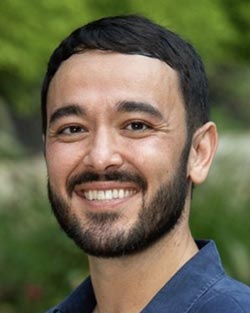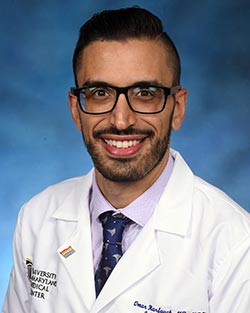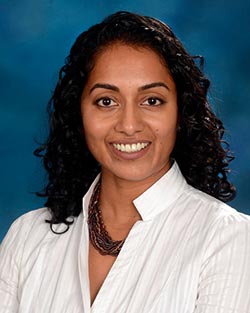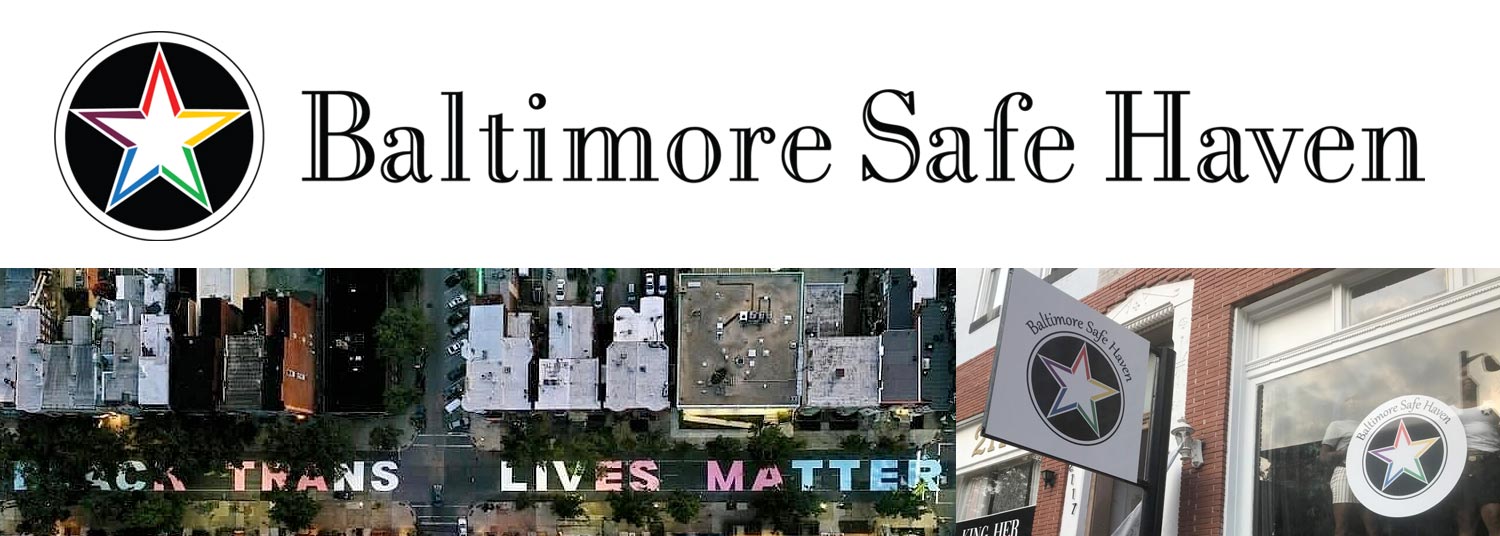June 26, 2023 | Vanessa McMains
Partnership Builds Trust with LGBTQ+ Community and Helps Eliminate Barriers to Health Care Access
The University of Maryland School of Medicine (UMSOM) Institute of Human Virology’s (IHV) Research Initiative on Infectious Disease and Substance Use (RIIS) engages marginalized populations in Baltimore and Washington, D.C., offering treatment for substance abuse and endemic infections in a community-based setting, with the goal of establishing research programs.
 In Baltimore, the RIIS team connects with community members at the Health and Recovery Practice (HARP) space, a clinic that treats addiction and offers primary care and mental health services. However, the RIIS team knew of other populations in the city they had not yet reached, specifically sexual and gender minorities.
In Baltimore, the RIIS team connects with community members at the Health and Recovery Practice (HARP) space, a clinic that treats addiction and offers primary care and mental health services. However, the RIIS team knew of other populations in the city they had not yet reached, specifically sexual and gender minorities.
“There are challenges to getting treatment to people who use drugs, as you only see patients who made it into the clinic,” said David Sternberg, MHA, Manager of Health Programs at RIIS, Division of Clinical Care and Research at UMSOM’s IHV. “We wanted to better reach people in our community who were not already connected to care, so we had to figure out how to find them.”
Sexual and gender minorities, and especially people who are transgender, tend to be more likely to use substances and are at greater risk for sexually transmitted infections, much of this as a direct byproduct of the stigma and discrimination they face on a day-to-day basis. According to the U.S. Health and Human Services, an estimated 20-30% of gay and transgender people abuse substances compared to less than 10% of the general population. Approximately 14% of transgender women have HIV, but the rates are much higher for Black and Hispanic individuals, according to the U.S. Centers for Disease Control and Prevention.
In order to reach this population, the RIIS team approached Baltimore Safe Haven last summer to establish a potential partnership opportunity. Baltimore Safe Haven is a grassroots, non-profit organization led by transgender women of color that provides safe housing and supportive services for transgender individuals. The group also advocates for LGBTQ+ supportive legislation in Annapolis. Specifically, Baltimore Safe Haven has a drop-in center near Penn Station that offers services, clothes, meals, and a trusted environment.
 The RIIS team worked directly with Baltimore Safe Haven’s Founder and Executive Director, Iya Dammons, to establish what the group’s unmet medical needs were and how they could assist. Starting in January, the Baltimore RIIS team began seeing members of the community at Baltimore Safe Haven’s drop-in location one day a week. The team provides gender-affirming care, prescribes HIV prevention medication (PrEP), and performs testing and care for sexually transmitted infections.
The RIIS team worked directly with Baltimore Safe Haven’s Founder and Executive Director, Iya Dammons, to establish what the group’s unmet medical needs were and how they could assist. Starting in January, the Baltimore RIIS team began seeing members of the community at Baltimore Safe Haven’s drop-in location one day a week. The team provides gender-affirming care, prescribes HIV prevention medication (PrEP), and performs testing and care for sexually transmitted infections.
“Baltimore Safe Haven allows us to meet the community where they are. These patients are not going to be seen in a traditional health care setting,” said Omar Harfouch, MD, MPH, Assistant Professor of Medicine, Division of Clinical Care and Research, at UMSOM’s IHV. “Many of these people are scared of going to a clinical setting, as they have faced much discrimination already, and they may not want to encounter people who aren’t transgender.”
What’s more, in a traditional clinic setting there may be long wait times, restrictions on acceptable insurance, and other barriers to access. Some people even choose to get unregulated hormones on the street, according to Dr. Harfouch.
“You see that you are making a difference in the lives of these patients who really need these medications, and they are so grateful for all the care they get,” said Dr. Harfouch.
 Dr. Harfouch sees patients while Mr. Sternberg is responsible for continually managing the relationship of RIIS’ partnerships like the one with Baltimore Safe Haven. His many roles include navigating cultural competencies, making sure spaces have what people need, ensuring people are using the correct names/pronouns, identifying what services are needed and which of those the team can address, and lifting barriers to care and communication.
Dr. Harfouch sees patients while Mr. Sternberg is responsible for continually managing the relationship of RIIS’ partnerships like the one with Baltimore Safe Haven. His many roles include navigating cultural competencies, making sure spaces have what people need, ensuring people are using the correct names/pronouns, identifying what services are needed and which of those the team can address, and lifting barriers to care and communication.
The team also includes Research Assistant Meghan Derenoncourt, Clinical Research Specialist Onyinyechi Ogbumbadiugha, MPH, and Nurse Coordinator Walker Weinstein, RN. Sarah Kattakuzhy, MD, MPH, Associate Professor of Medicine, Baltimore RIIS Director, Division of Clinical Care and Research, manages the program.
“This is truly a team effort, and we are grateful to Iya and Baltimore Safe Haven for opening their space to us as guests,” said Dr. Kattakuzhy. “Community research collaborations require the right ingredients for success. The most vital elements are to have an amazing team that you can trust, a strong community partner, and a unified commitment to improving health through the power of research.”
 “IHV’s mission is to improve the lives of people afflicted with or predisposed to chronic viral infections, such as HIV, particularly to the most marginalized groups,” said Shyam Kottilil, MBBS, PhD, Professor of Medicine, Interim IHV Director, and Director of the Division of Clinical Care and Research at UMSOM’s IHV. “Our team at Baltimore Safe Haven is an example of IHV’s dedication, commitment, and outreach to the most marginalized trans population. I applaud them and their community partners at Safe Haven for their efforts.”
“IHV’s mission is to improve the lives of people afflicted with or predisposed to chronic viral infections, such as HIV, particularly to the most marginalized groups,” said Shyam Kottilil, MBBS, PhD, Professor of Medicine, Interim IHV Director, and Director of the Division of Clinical Care and Research at UMSOM’s IHV. “Our team at Baltimore Safe Haven is an example of IHV’s dedication, commitment, and outreach to the most marginalized trans population. I applaud them and their community partners at Safe Haven for their efforts.”
Eventually RIIS hopes to recruit patients for research studies. Some of the projects they hope to initiate include assessing how many people use drugs, calculating the risk factors for drug use, and investigating whether long-acting HIV PrEP injectables work better than daily pills for adherence to treatment.
“Before we even approach the idea of research, we need to build and earn trust and better understand their needs, so we can make a positive impact in the Baltimore trans community,” said Mr. Sternberg.
About the Institute of Human Virology
 Formed in 1996 as a partnership between the State of Maryland, the City of Baltimore, the University System of Maryland, and the University of Maryland Medical System, the IHV is an institute of the University of Maryland School of Medicine and is home to some of the most globally recognized and world-renowned experts in all of virology.
Formed in 1996 as a partnership between the State of Maryland, the City of Baltimore, the University System of Maryland, and the University of Maryland Medical System, the IHV is an institute of the University of Maryland School of Medicine and is home to some of the most globally recognized and world-renowned experts in all of virology.
The IHV combines the disciplines of basic research, epidemiology, and clinical research in a concerted effort to speed the discovery of diagnostics and therapeutics for a wide variety of chronic and deadly viral and immune disorders, most notably HIV, the virus that causes AIDS. For more information, visit ihv.org and follow us on Twitter @IHVmaryland.
About the University of Maryland School of Medicine
Now in its third century, the University of Maryland School of Medicine was chartered in 1807 as the first public medical school in the United States. It continues today as one of the fastest growing, top-tier biomedical research enterprises in the world — with 46 academic departments, centers, institutes, and programs, and a faculty of more than 3,000 physicians, scientists, and allied health professionals, including members of the National Academy of Medicine and the National Academy of Sciences, and a distinguished two-time winner of the Albert E. Lasker Award in Medical Research. With an operating budget of more than $1.3 billion, the School of Medicine works closely in partnership with the University of Maryland Medical Center and Medical System to provide research-intensive, academic, and clinically based care for nearly 2 million patients each year. The School of Medicine has nearly $600 million in extramural funding, with most of its academic departments highly ranked among all medical schools in the nation in research funding. As one of the seven professional schools that make up the University of Maryland, Baltimore campus, the School of Medicine has a total population of nearly 9,000 faculty and staff, including 2,500 students, trainees, residents, and fellows. The combined School of Medicine and Medical System (“University of Maryland Medicine”) has an annual budget of over $6 billion and an economic impact of nearly $20 billion on the state and local community. The School of Medicine, which ranks as the 8th highest among public medical schools in research productivity (according to the Association of American Medical Colleges profile) is an innovator in translational medicine, with 606 active patents and 52 start-up companies. In the latest U.S. News & World Report ranking of the Best Medical Schools, published in 2021, the UM School of Medicine is ranked #9 among the 92 public medical schools in the U.S., and in the top 15 percent (#27) of all 192 public and private U.S. medical schools. The School of Medicine works locally, nationally, and globally, with research and treatment facilities in 36 countries around the world. Visit medschool.umaryland.edu
Contact
Vanessa McMains
Director, Media & Public Affairs
University of Maryland School of Medicine
Institute of Human Virology
vmcmains@ihv.umaryland.edu
Cell: 443-875-6099

